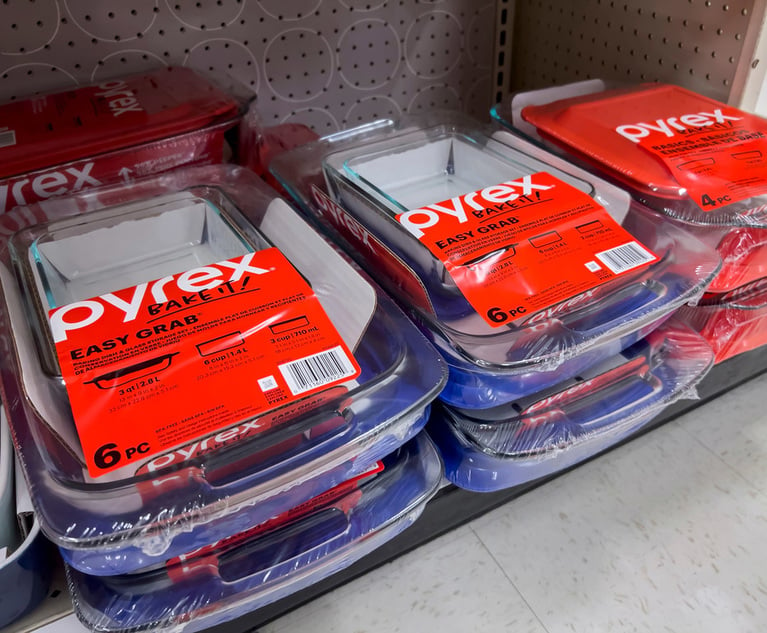 Rows of american football balls in NFL Experience in Times Square, New York. Photo: Alena Veasey/Shutterstock.com
Rows of american football balls in NFL Experience in Times Square, New York. Photo: Alena Veasey/Shutterstock.com Lit Funder Thrivest Asks Third Circuit to Further Review District Judge's Stance on Contracts With Players
Thrivest filed a petition for a writ of mandamus with the Third Circuit last week, saying the district court and class action claims administrator are not following the appeals court's April ruling, which prevented the nullification of lending agreements in their entirety.
September 23, 2019 at 04:25 PM
5 minute read
A litigation funder that aims to enforce lending agreements with retired NFL players wants to see a penalty flag thrown against the district court that is overseeing the concussion class action settlement, arguing it is not following the U.S. Court of Appeals for the Third Circuit's guidance by allowing the funding agreements to be broadly invalidated.
Thrivest, an Ardmore, Pennsylvania-based lending company, filed a petition for a writ of mandamus with the Third Circuit last week, saying the district court and class action claims administrator are not following the appeals court's April ruling, which prevented the nullification of lending agreements in their entirety.
According to the 13-page petition, which was docketed with the Third Circuit on Sept. 20, the court and claims administrator in the U.S. District Court for the Eastern District of Pennsylvania are continuing to improperly void agreements. Thrivest also said confusion had been sown among the former players who took out loans.
"These court-sponsored communications are likely to influence class members to ignore their contractual promises or to take on additional risk in arbitration, and, as such, they are likely to cause irreparable injury—in the form of additional financial obligations under the agreement and legal fees associated with the ever-protracting dispute (which are recoverable under the agreement)," Thrivest said in the petition, which Fox Rothschild attorney Peter Buckley filed.
By Monday afternoon, the Third Circuit issued an order saying U.S. District Judge Anita Brody of the Eastern District of Pennsylvania, who is overseeing the settlement, must respond to the petition by Oct. 4. The three-judge panel that issued the order is the same panel that made the April ruling.
Thrivest's petition comes as the lending company is seeking to hold two former players in contempt for failing to escrow interim arbitration awards stemming from loans the ex-players took out. In one case, player Toby Wright was ordered to put $800,000 in his attorney's escrow account, and in the other case William White was ordered to put $1.25 million into escrow.
Court papers said Wright's case stemmed from a nearly $324,000 advance, and White's case involves a $500,000 advance. Wright, according to court papers, received a $1.9 million award, and White received a $3.5 million award.
The writ to the Third Circuit comes nearly two years after Brody barred third-party litigation funders from entering into assignment agreements with retired players, who are seeking to recover from the concussion litigation settlement, which is anticipated to cost $1 billion. Brody specifically pointed to language in the settlement agreement that forbids lenders from entering into loan agreements that require ex-players to assign over their monetary claims.
"A third-party funder that failed to perform proper due diligence before deciding to enter such an agreement is prohibited from now reaping the benefit of the contract," Brody said.
A unanimous three-judge Third Circuit panel, however, disagreed, saying the order "went beyond pure issues of settling administration to adjudicate the third-party contract rights of litigation funding companies."
"The district court's authority certainly does not extend to how class members choose to use their settlement proceeds after they are disbursed. The district court made no findings indicating that any aspects of the cash advance agreements, other than assignments, impaired the integrity of the settlement process," Judge D. Brooks Smith said in the 34-page opinion.
According to the panel, the lower court had broad authority to protect the integrity of the settlement and was therefore within its power to bar portions of any agreements that allowed the companies to seek funds directly from the claims administrator. However, the Third Circuit panel said the district court went too far in voiding the contracts entirely, and said the court did not have the authority to void contracts in which the companies sought to seek funds from the players directly.
Smith also said that, although contracts seeking money from the class administrator are void, the companies could try to enforce contracts it has directly with the players, and disputes over enforceability, including a particular claim involving Thrivest, could proceed through the courts or arbitration.
However, according to Thrivest's petition, the claims administrator made no significant changes to the review procedure in the wake of the Third Circuit's ruling, and was continuing to allow agreements to be nullified in their entirety.
"The claims administrator continues to consider criteria such as 'the fairness and commercial reasonableness of the [agreement's] terms and whether they reflect the type of transaction the court found invalid in its explanation and order,'" the memo said. "Such criteria have nothing to do with whether a contractual provision is a 'true assignment,' as this court defined that concept."
The writ asks the Third Circuit to order the lower court to stop allowing "transaction-level determination[s]" about the validity of the lending agreements, require the claims administrator and court to only consider whether the loans were " true assignment[s]," and issue "corrective communication" making it clear that the court and claims administrator cannot void the agreements entirely.
Brad Karp of Paul, Weiss, Rifkind, Wharton & Garrison is representing the NFL, and Seeger Weiss attorney Christopher Seeger is class counsel. Neither returned a message seeking comment. Buckley declined to comment beyond the filing.
This content has been archived. It is available through our partners, LexisNexis® and Bloomberg Law.
To view this content, please continue to their sites.
Not a Lexis Subscriber?
Subscribe Now
Not a Bloomberg Law Subscriber?
Subscribe Now
NOT FOR REPRINT
© 2024 ALM Global, LLC, All Rights Reserved. Request academic re-use from www.copyright.com. All other uses, submit a request to [email protected]. For more information visit Asset & Logo Licensing.
You Might Like
View All
Immunity for Mental Health Care and Coverage for CBD: What's on the Pa. High Court's November Calendar
5 minute read

Trending Stories
- 1Trying a Case for Abu Ghraib Detainees Two Decades After Abuse
- 2The Distribution of Dangerous Products Via Online Marketplaces
- 3The Products Liability Case Against Tianeptine: The Deadly ‘Dietary Supplement’ Found at Your Local Store
- 4The Evolving Landscape of Joint and Several Liability in Pa.: A Post-'Spencer' Analysis
- 5A Deep Dive Into the Product-Line Exception in Pennsylvania
Who Got The Work
Michael G. Bongiorno, Andrew Scott Dulberg and Elizabeth E. Driscoll from Wilmer Cutler Pickering Hale and Dorr have stepped in to represent Symbotic Inc., an A.I.-enabled technology platform that focuses on increasing supply chain efficiency, and other defendants in a pending shareholder derivative lawsuit. The case, filed Oct. 2 in Massachusetts District Court by the Brown Law Firm on behalf of Stephen Austen, accuses certain officers and directors of misleading investors in regard to Symbotic's potential for margin growth by failing to disclose that the company was not equipped to timely deploy its systems or manage expenses through project delays. The case, assigned to U.S. District Judge Nathaniel M. Gorton, is 1:24-cv-12522, Austen v. Cohen et al.
Who Got The Work
Edmund Polubinski and Marie Killmond of Davis Polk & Wardwell have entered appearances for data platform software development company MongoDB and other defendants in a pending shareholder derivative lawsuit. The action, filed Oct. 7 in New York Southern District Court by the Brown Law Firm, accuses the company's directors and/or officers of falsely expressing confidence in the company’s restructuring of its sales incentive plan and downplaying the severity of decreases in its upfront commitments. The case is 1:24-cv-07594, Roy v. Ittycheria et al.
Who Got The Work
Amy O. Bruchs and Kurt F. Ellison of Michael Best & Friedrich have entered appearances for Epic Systems Corp. in a pending employment discrimination lawsuit. The suit was filed Sept. 7 in Wisconsin Western District Court by Levine Eisberner LLC and Siri & Glimstad on behalf of a project manager who claims that he was wrongfully terminated after applying for a religious exemption to the defendant's COVID-19 vaccine mandate. The case, assigned to U.S. Magistrate Judge Anita Marie Boor, is 3:24-cv-00630, Secker, Nathan v. Epic Systems Corporation.
Who Got The Work
David X. Sullivan, Thomas J. Finn and Gregory A. Hall from McCarter & English have entered appearances for Sunrun Installation Services in a pending civil rights lawsuit. The complaint was filed Sept. 4 in Connecticut District Court by attorney Robert M. Berke on behalf of former employee George Edward Steins, who was arrested and charged with employing an unregistered home improvement salesperson. The complaint alleges that had Sunrun informed the Connecticut Department of Consumer Protection that the plaintiff's employment had ended in 2017 and that he no longer held Sunrun's home improvement contractor license, he would not have been hit with charges, which were dismissed in May 2024. The case, assigned to U.S. District Judge Jeffrey A. Meyer, is 3:24-cv-01423, Steins v. Sunrun, Inc. et al.
Who Got The Work
Greenberg Traurig shareholder Joshua L. Raskin has entered an appearance for boohoo.com UK Ltd. in a pending patent infringement lawsuit. The suit, filed Sept. 3 in Texas Eastern District Court by Rozier Hardt McDonough on behalf of Alto Dynamics, asserts five patents related to an online shopping platform. The case, assigned to U.S. District Judge Rodney Gilstrap, is 2:24-cv-00719, Alto Dynamics, LLC v. boohoo.com UK Limited.
Featured Firms
Law Offices of Gary Martin Hays & Associates, P.C.
(470) 294-1674
Law Offices of Mark E. Salomone
(857) 444-6468
Smith & Hassler
(713) 739-1250






